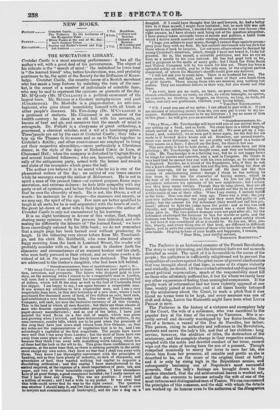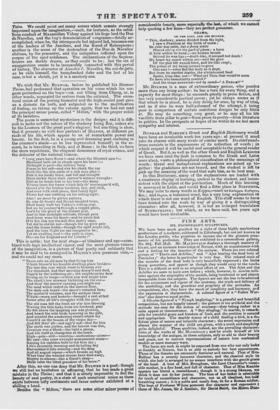The Tuileries is an historical romance of the French Revolution.
The story is very interesting, and the historical facts are not so much distorted as usual. The spirit of it is favourable to the cause of the people ; the authoress is sufficiently enlightened not to pervert the sympathies of readers against the great cause of general amelioration that was brought about at that time, in some of its stages violently and wickedly, no doubt. Of the evil which attended and disgraced this grand political regeneration, much of the responsibility must fall on those who ultimately suffered for, it but for whom we rarely hear any other expression of feeling than unmingled compassion. If the goodly work of reformation had not been violently opposed at one time, weakly joined at another, and at all times basely betrayed by the aristocracy about the Court, to such a pitch that it was found no terms were to be kept, and every measure was one of shift and delay, Louis the Sixteenth might have been what Louis PHILIP is now.
The Tuileries is the history of a virtuous and exemplary lady of the Court, the wife of a nobleman, who was sacrificed to the popular fury at the time of the escape to Varennes. She is se- cretly served and devoutly worshipped by her foster-brother, the son of a farmer, a vassal of the Due de Navelles, her father. This person, rising to authority and influence in the Revolution, protects and saves the lady's life, and that of her children : long service, however, the abolition of titles, the destruction of the aristocracy, and the complete change in their respective conditions, coupled with the noble and devoted conduct of her lover, cannot wipe out the stain of having been the son of a peasant. Though compelled nominally to marry her lover to save her life, she drives him from her presence, all amiable and gentle as she is described to be, on the score of the original taunt of birth; and it is only by rising high in the Republican armies, and subsequently becoming one of Napoleon's most succgssful generals, that the lady's feelings are brought down to the modern standard, that the old aristocratical leaven is worked out, and that she consents to become actually the wife of one of the most virtuous and distinguished men of France, We can recommend the principles of this romance, and the skill with which the details are worked up do honour eyeu to the authoress of the HuttgatiotA Tales. We could point out many scenes which remain strongly impressed upon the imagination,--such, for instance, as the rebel- lious conduct of Maxamilian Valazy against his liege lord the Due de Navelles, and the boys denunciation of vengeance—fatally ac- complished, when he, the intemperate but injured lad, becomes one of the leaders of the Jacobins, and the friend of Robespierre: another is the scene of the destruction of the Due de Navelles' chiteau, by the peasantry, and the indignities inflicted upon the corpse of the aged nobleman. The deliberations of the Septem- brizers are darkly drawn, as they ought to be ; but the sin of exaggeration seems to be inseparably connected with this period of history. The character of Amed6e dt Navelles, the cul-de-jatte, as he calls himself, the humpbacked duke and the last of his race, is but a sketch, yet it is a masterly one.



























 Previous page
Previous page